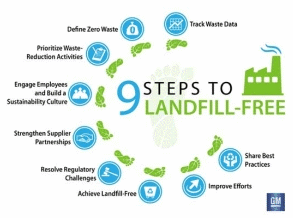 General Motors Corp. is taking on something beyond one of the largest recalls in auto industry history — GM is challenging its industry peers to do the right thing – build cars in a sustainable, energy efficient, responsible manner. “People care about more than the cars,” said GM CEO Mary Barra in the automaker’s corporate environmental and sustainability report. “They care how we build them, and how we engage with the world around us. This knowledge, and the discipline that flows from it, is transforming our approach to product design, manufacturing, safety, quality, the environment, customer care and a host of other areas at a remarkable pace,” Barra said. For several years, GM has taken on that challenge in its manufacturing plant landfill and energy efficiency campaign; that saved the company $162 million in combined energy costs last year. Good examples of it came from removing coal-fired boilers at its Detroit-Hamtramck assembly plant, and saving $10 million in annual energy costs by using landfill gas at its Fort Wayne and Orion assembly plants. Another recently announced accomplishment was the installation of its 401st electric vehicle charging station at its US production and business facilities. More than 20% of the stations use electricity powered by solar canopies so that employees can cleanly charge their Chevrolet Volts, Spark EVs, and Cadillac ELR plug-in hybrids.
General Motors Corp. is taking on something beyond one of the largest recalls in auto industry history — GM is challenging its industry peers to do the right thing – build cars in a sustainable, energy efficient, responsible manner. “People care about more than the cars,” said GM CEO Mary Barra in the automaker’s corporate environmental and sustainability report. “They care how we build them, and how we engage with the world around us. This knowledge, and the discipline that flows from it, is transforming our approach to product design, manufacturing, safety, quality, the environment, customer care and a host of other areas at a remarkable pace,” Barra said. For several years, GM has taken on that challenge in its manufacturing plant landfill and energy efficiency campaign; that saved the company $162 million in combined energy costs last year. Good examples of it came from removing coal-fired boilers at its Detroit-Hamtramck assembly plant, and saving $10 million in annual energy costs by using landfill gas at its Fort Wayne and Orion assembly plants. Another recently announced accomplishment was the installation of its 401st electric vehicle charging station at its US production and business facilities. More than 20% of the stations use electricity powered by solar canopies so that employees can cleanly charge their Chevrolet Volts, Spark EVs, and Cadillac ELR plug-in hybrids.
And in other clean transportation news…….
- Interested in earning California cap-and-trade credits, or entering the California Air Resources Board’s (CARB) cap-and-trade carbon credit auctions? ICIS and Environmental Leader are hosting a one-hour carbon market webinar on June 4, 2014, at 2:00 EDT. That came out of California’s Assembly Bill 32 and is still in its early phase, and transportation is part of it. CARB has set up several market instruments to help companies manage their carbon compliance obligations, which means purchasing California Carbon Allowances. Learn more and register here.
- Green Auto Market now has an affiliates shopping page linking readers to participating services. Affiliates include the Zipcar car sharing service, the TrueCar pricing and information website, TigerGPS driving navigation, K-Tor Generators human powered portable energy, Advance Auto Parts, and others.
- Electric Drive Transportation Association (EDTA) held its annual conference last week in Indianapolis. One of the central topics was the EV Everywhere Grand Challenge; that’s the US Energy Department’s 10-year vision to enable the US to be the first nation in the world to produce plug-in electric vehicles that are as affordable for the average American family as today’s gasoline powered vehicles by 2022. And read the feature article below on EDTA’s partnership with Andretti Formula E.
- BMW is banking on carbon fiber to make its plug-in and other models more energy efficient, but carbon fiber does have its share of critics. They’re saying that the supply chain is too long and isn’t eco-friendly. BMW makes the case that its lightweight material holistically reduces its carbon footprint.
- Hands-free, wearable computer eyeglass Google Glass is working with SemaConnect in offering an app that locates electric vehicle charging stations. But that only applies to SemaConnect’s ChargePro network that only has about 300 US and Canada charging stations so far.
- The bad news from Navigant Research is that light-duty vehicle sales will grow from nearly 84.1 million in 2014 to about 127 million in 2035. The good news is that the market analyst firm predicts that less than half of them will be conventional internal combustion engine vehicles. Light duty stop-start, hybrid, plug-in hybrid, battery electric, natural gas, and fuel cell vehicles will make up a large share of it.
- Navigant Research also predicted that biofuels will make up 7.5% of the fuel mix for road transportation by 2022. That percentage will be made up of ethanol blends, cellulosic feedstock biofuels, biodiesel, drop-in biofuels used in aviation, and other advanced biofuels. It’s coming from concerns expressed by many governments, corporations, and individuals who see biofuels as a promising solution to solving the energy security, environmental, and economic challenges associated with petroleum dependency.



